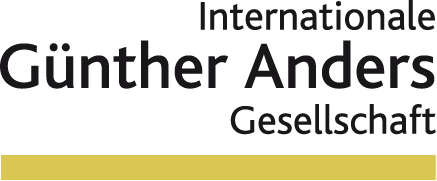The plasticity of emotions - Günther Anders’ contribution to the history of feelings
In the first volume of Die Antiquiertheit des Menschen (“The Obsolescence of Man”), Günther Anders states that the lack of a history of emotions might be considered “the biggest desideratum of any philosophy of history and historical science”. This claim represents an example of Anders’s astonishing clairvoyance. Already in 1956, he pointed to a field of research which has received full attention only during the last thirty years. Anders himself very early provided several fragments for such a history. Thus, in Die Antiquiertheit des Menschen he speaks of an emotional ‘gap’. The “slowness of the transformation of emotions” results, as he thinks, in a ‘discrepancy’ between the human capacity of feeling and the challenges of an environment produced mainly by men. Therefore, according to Anders, the capacity of feeling has to be modelled in order to adjust it to a very different reality.
Adopting a word from Rilke’s Duino Elegies (1922), Anders demands an ‘effort’ of feeling, “a voluntary expansion of our emotional comprehension faculty”. His book Love Yesterday (1986) was also intended to present— as the subtitle suggests—Notes on the History of Feelings. It is concerned with the transformation of love at the turn from the nineteenth to the twentieth century.
Taking into consideration the experiences of two wars, emigration, but also the impact of psychoanalysis, Anders points out, love can no longer be regarded as the same. With the conference at the University of Copenhagen, organised in collaboration with the International Günther Anders Society, this very independent contribution to a field which nowadays is known as ‘emotion research’ will receive due critical appraisal.
The conference will be held in English and German.
The conference is part of the VELUX project Where Love Happens: Topographies of Emotions in Nineteenth-Century European Literature, hosted by the University of Copenhagen.
We try to reimburse all participants their expenses for travel and accomodation as far as possible. At this point of time, however, we cannot give any guarantees for this.
Programme
Thursday, 29 June 2023
| 13:00 | Official welcome and introduction |
| 13:15 | Alexander Knopf (Copenhagen): On emotions and truth |
| 14:00 | Bernd Bösel (Potsdam): Vernichtbarkeit. Zur Entdeckung der Psycho-Plastizität |
| 14:45 | coffee break |
| 15:00 | Christopher J. Müller (Sydney): „Faust is Dead“: Anders and the Ruins of Romanticism |
| 15:45 |
Christian Dries (Freiburg): Gelegenheit macht Methode. Günther Anders’ philosophischer |
| 16:30 | coffee break |
| 16:45 | Christine Hentschel (Hamburg): Stretches at the Edge: Anders, Affect, and the Anthropocene |
| 17:30 | Burkhardt Wolf (Vienna): Age of anxiety? Anders auf der Suche nach der verlorenen Angst |
Friday, 30 June 2023
| 9:00 | Jason Dawsey (New Orleans): The Obsolescence of Hatred? Günther Anders and the Menace of Antisemitism |
| 9:45 | Ana Antic (Copenhagen): Madness as a „pathology of feedom“: Fanon, Anders and discourses of insanity |
| 10:30 | coffee break |
| 11:00 | Benjamin Steege (New York): The Bruckner Apparatus |
| 11:45 | Bernhard Fetz (Vienna): Ich, jetzt, hier – Lieben gestern als Archiv der Gefühle |
| 12:30 | lunch break |
| 13:30 | Manuela Kölke (Berlin): Betroffenheit trotz Distanz: Zum Übersetzen von Unmittelbarkeit in Lieben Gestern |
| 14:15 | Paola Bozzi (Milan): Der Umkreis ozeanischer Gefühle. Mariechen und die Liebe als Daseinslust |
| 15:00 | coffee break |
| 15:30 | Kerstin Putz (Vienna): Gefühle in Geschichten. Günther Anders als Fabeldichter |
| 16:15 | Simon Angerer (Vienna): Molussische Psychotechniken: Über die technische Bearbeitung der Seele in der Zwischenkriegszeit |
Saturday, 1 July 2023
| 9:00 | Sven Grampp (Erlangen-Nürnberg): Anders die Gefühle der Medien vom Mond aus betrachten |
| 9:45 | Benjamin Nickl (Sydney): On Popular Plastic Feeling: Anders, Matrix Mouse, and the Template Universe |
| 10:30 | coffee break |
| 10:45 | Sophie Johanna Schweiger (New Haven): Intergenerational Solidarity: Greta, Günther & The Art of ‚Advancing Empathy‘ |
| 11:30 | Martin Kudla (Frankfurt/Main): Die Zukunft der Gefühle. Günther Anders und Robert Jungk |
| 12:15 | conclusion |
Partner
Map of South Campus
View directions.
View on map of the Faculty of Humanities - South Campus.
View map of South Campus (pdf).




